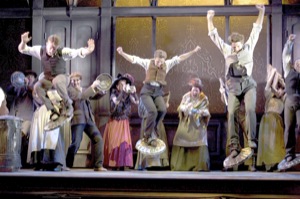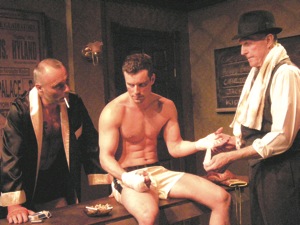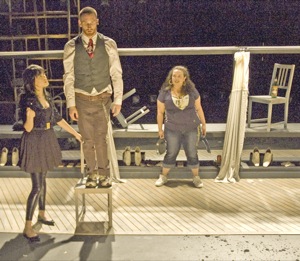-
- Likely lesbian mayor hopeful caught up in scandal
- Clinton goes on record supporting gay rights
- Obama takes stance on gays in military
- Gay Mormon group to meet with church officials
- Popular textbook criticizes gay Supreme Court ruling
- Judge rules in favor of breakaway Episcopal congregations
- National News Briefs
- World News Briefs
Theater
‘Lady’ entertains, despite tinkering
‘Lost Plays of Tennessee Williams’ and ‘Miss Julie’ also on stage
Published Thursday, 17-Apr-2008 in issue 1060
‘My Fair Lady’
Eliza Doolittle is back. That charming urchin with the dreadful Cockney accent, “wretched clothes and dirty face” can be seen in the national tour of Trevor Nunn’s 2001 My Fair Lady revival for London’s National Theatre. The show plays through April 27 at the Ahmanson Theatre in Los Angeles.
The original Pygmalion story penned by George Bernard Shaw is a winner on its own merits, but Lerner and Loewe actually improved it with their smashing score, one so good it could be argued that My Fair Lady is the greatest musical ever written.
That’s why it’s difficult and annoying to see it tinkered with.
“You didn’t have to mess around with it much,” choreographer Matthew Bourne is quoted as saying, “just heighten it and make it better.”
And then he made it worse, with help from set designer Anthony Ward. This production seems both spatially cramped and stuffed with unnecessary action, from the stop-action characters wandering across the stage during the overture (does Bourne fear audiences will fall asleep without visuals for a few minutes?) to the trash can lid dance reminiscent of Stomp, which is energetic and fun to watch but doesn’t look 1910.
Ah, but the music! Do what damage you will to make it “better,” nobody can take away those gloriously clever and lyrical songs like “Why Can’t the English” and “On the Street Where You Live.”
The cast is mostly fine to fabulous, and it’s impossible not to love these utterly engaging characters – that exasperating linguist Henry Higgins (Christopher Cazenove), his rather kinder sidekick Col. Pickering (Walter Charles), their victim, er, project Eliza (Lisa O’Hare) and her bigger-than-life dad, Alfred P. Doolittle (Tim Jerome). It’s also a treat to see Marni Nixon (the voice of the Hollywood musical film, including Audrey Hepburn’s voice in My Fair Lady) as Mrs. Higgins.
O’Hare, a relative unknown (her claim to fame is playing Mary Poppins in London), is very, very cute, but nobody seems to have told her Eliza isn’t cute, she’s a diamond in the rough and we’re not really supposed to notice how pretty she is until she goes off to Ascot all spiffed up. She has a lovely voice, but had a few problems with high notes on opening night.
Cavils aside, My Fair Lady is such a strong show that it can be weakened easily but ruined only with great effort. This production has enough strengths to provide a lovely night in the theater.
My Fair Lady plays through April 27 at the Ahmanson Theatre in Los Angeles. Shows Tuesday through Saturday at 8 pm; Saturday at 2 pm.; Sunday at 1 and 6:30 p.m. For tickets call (213) 628-2772 or visit www.centertheatregroup.org.
‘The Lost Plays of Tennessee Williams’
Tennessee Williams once described his one-act plays as “the little glass slippers lost in my midnight scramble down the stairs.”
In 2005, a volume of previously unpublished one-act plays was released. Three from that collection – Mister Paradise, The Palooka and And Tell Sad Stories of the Deaths of Queens – are onstage through June 8 at The Lily Tomlin/Jane Wagner Cultural Arts Center in Hollywood.
Interesting in the same way and for the same reason that Beethoven’s Choral Fantasy can be seen as foreshadowing his monumental Ninth Symphony, these plays (two probably written in the 1930s and one in 1959) use some of the themes common to his major works – loneliness, disaffection, betrayal, missed opportunity, survival. The last piece – And Tell Sad Stories of the Deaths of Queens, the truly sad story of a jilted transvestite who searches for love and gets abuse from one who cannot reciprocate – is the most personal of the trio.
Mister Paradise, directed by Robert Burgos, is a lovely, lyrical piece dating from about 1939. The Girl (Melissa Lechner), a graduate student and reader of a slim volume of poetry that affected her greatly, has finally tracked its obscure author to a seedy New Orleans apartment.
Jack Heller perfectly captures the mood of slowly disintegrating poet Mister Paradise, flattered by this long-denied recognition, but wanting no part of her plan to reintroduce him to the world. “Death is the only thing that can possibly save my reputation,” he says.
The Palooka, directed by Brian Foyster, a short meditation on the fleeting nature of fame, records a conversation in the dressing room of a boxing ring between The Palooka (Timothy V. Murphy), “the biggest has-been in the racket” and The Kid (Jason Lopez), preparing for his first fight.
This is the least interesting of the three, but don’t blame the fine actors for the fact that this feels fragmentary and unfinished and that it depends on an obvious reveal.
Jack Heller directs And Tell Sad Stories of the Deaths of Queens, the longest of the trio and also the most personal, reflecting Williams’ difficulties with his own homosexuality through transvestite Candy Delaney (Brian Foyster).
Jilted after a 17-year relationship, Candy longs for connection, but brings home an utterly unsuitable candidate in hard-drinking sailor Karl (Chris Rydell), who just wants a woman. Though it’s clear that this encounter cannot end well, Foyster and Rydell play to the inevitability so well that it will still tear your heart out.
Kudos to the theater for presenting these Williams “glass slippers,” which are definitely worth seeing even if they’re not all masterpieces.
The Lost Plays of Tennessee Williams play through June 8 at the Davidson/ Valentini Theatre at the L.A. Gay & Lesbian Center’s Lily Tomlin/Jane Wagner Cultural Arts Center in Hollywood. Shows Friday and Saturday at 8 p.m.; Sunday at 7:30 p.m. For tickets call (323) 860-7300 or visit www.lagaycenter.org/boxoffice.
‘Miss Julie’
Lust and power, animal magnetism and the falseness of class distinctions play out against a background of Midsummer Eve in late 19th century Sweden in August Strindberg’s Miss Julie. Adapted and directed by Angeleno Josh Chambers, Miss Julie plays through April 27 at the Tenth Avenue Theatre, under the Sledgehammer Theatre banner.
It’s clear from the setup that this is not your average play. A black and white palette, loud but simple music and a two-tiered set all serve as backdrop for Miss Julie (Claire Smith), who stands holding a pig diagram (ham-bacon-chops-roast-shoulder) at the top of the show while an endless loop of her voice tells us “had I not gone into acting, I probably would have gone to college and become a teacher. That was my dream.”
Instead, Miss Julie grew into a 25-year-old misanthrope, carefully taught by her lower class mother to despise men for the powerlessness they impose on women. Julie’s mother even went to the extreme of raising her daughter as a boy.
But it’s Midsummer Eve, the citizens are getting a little crazy, and Miss Julie takes a liking to her dad’s chauffeur John (William Popp), who is informally engaged to the cook, Kristine (Charlotte DiGregorio).
What follows is a feverish encounter, a 90-minute affair progressing with lightning speed from flirting to power games to annoyance to the inevitable bad ending, played out with, around and on straight-backed chairs, accompanied from time to time by Kristine singing (too often incomprehensibly).
Smith and Popp exhibit the sinuous athleticism of youth; their ill-fated union can be seen as the crumbling of 19th century aristocracy and the birth of a new type of political and social relationship – or just as elements of a really strange play, probably arising from the playwright’s situation at the time.
Strindberg suffered personal and professional reversals such as failed marriages and prosecution for blasphemy for his short story collection Married. Psychologically unstable and increasingly given to violent hallucinations and paranoia. Strindberg’s literary technique shifted from the naturalism of Miss Julie to the symbolism and expressionism of later plays like A Dream Play and Ghost Sonata.
Make no mistake, Miss Julie is weird theater, and not for all tastes. But Sledgehammer is known for pushing the envelope, and Chambers and his fine cast give us something different to see and ponder.
Sledgehammer Theatre’s production of Miss Julie runs through April 27 at the Tenth Avenue Theatre. Shows Thursday through Saturday at 8 p.m.; Sunday at 7 p.m.; matinee at 2 p.m. on April 27. For tickets call (619) 544-1484 or visit www.sledgehammer.org.
|
|
Copyright © 2003-2025 Uptown Publications




